Abstract
One of the main directions of state policy is the provision of equal opportunities for all categories of children, in particular, children at risk. Today it is necessary to create self-governing public associations aimed at overcoming social exclusion of adolescents at risk. As the results of the analysis have shown, the developed systems allow children at risk not fully find their place in the modern world,master the norms of ethical interaction and communicative-regulatory skills, communicative competence. Nowadays public associations in their essence are a place where active, gifted children realize their abilities. This article is devoted to the actual problem of ethical development of the adolescent personality in the system of pedagogical counseling in a public association. The presented study reflects the basic understanding of the category of adolescents at risk as a subject of education by Russian and foreign scientists. The authors provide an understanding of the category of adolescents at risk as an active subject of a public association that can adapt in the modern world,master the ethics of interaction in various systems of relations. The article reflects the various approaches of Russian and foreign studies on the problem of counseling children. The role of the counseling system in the ethical development of the adolescent at risk on the example of public associations is defined. From the authors’ position the main forms of the formation of subjective experience of a teenager at risk in a public association, in particular, the experience of ethical interaction, are revealed.
Keywords: Ethicspedagogical counsellingadolescents at risk
Introduction
The Program of Russian Education Modernization places priority on the development of an active civic position and the development of a safe and healthy lifestyle of children, ethics of communication and interaction with various social institutions. Today, as never before, it is necessary to create all conditions for supporting public initiatives and socially significant projects. In this regard, it is necessary to revise the purpose, content, forms and methods of training and education, the forms of interaction of subjects, determine effective educational institutions, to develop a mechanism for tracking results, to outline the main prospects for improving the educational and upbringing environment. The scientific and pedagogical community more often returns to the idea of reviving the activity of public organizations as one of the institutions for upbringing and development of ethical categories of personality, in particular, adolescents at risk.
Problem Statement
Recently, due to the deterioration of the environmental situation in the country, due to increasing tension in society and instability in the modern world, the number of adolescents at risk is increasing. Families, getting into a difficult life situation, more often let their children grow up independently. Such family problems are particularly dangerous for teenagers when the main components of their personality, self-concept are formed. Among self-sufficient, wealthy children this category of children feels outcasts, goes inside, and loses interest in learning and life. These children almost do not have communicative and regulatory skills, the ethics of horizontal and vertical interaction. And as a result, children live outside the modern reality. They are not able to adapt in the modern world.
Foreign researchers are also concerned about the problem of children at risk. Räty et al. (2019) consider making an individual educational plan as an integral part of the education of children at risk. This plan is widely used in Western countries and contains counseling measures for Finnish children at risk. Considering the academic underachievement of children, Ludicke et al. (2019) identified the following indicators at school: literacy and numeracy barriers; missed classes; family problems and lack of confidence in learning. In this regard, scientists noted the leading role of the teacher in the pedagogical counseling of such students. For children at risk the term academic underachievement is used by Australian researchers to describe students who do not attend school for any reason (Thomas, 2016) or they are at risk (Chadbourne, 2001). The authors note that academic underachievement in adolescents are associated with pervasive and lasting negative consequences outside school events.
Dunn et al. (2018) believe that adolescents are at risk due to the influence of social networks that affect their psychological development, ethical behaviour norms. The authors conducted a study, according to the results they came to the conclusion that any information spread through social networks can have positive aspects (preventive measures) and negative aspects (risks of drugs). Scientists describe methods to get rid of the risks of drug trafficking through social networks (Dunn et al.,, 2018). We totally agree with foreign authors in the need to search for new social institutions that make it possible to level social risks.
Let us turn to the problems of Russian education. At the moment the work of the teaching staff is mainly aimed at the results of the State Academic Examination and the Unified State Examination. The number of counselors, organizing teachers is reduced. Since these categories of teachers do not have pedagogical experience, there is a staff turnover. Experienced teachers are replaced by inexperienced young specialists who do not have the means of ethics of interaction with various social institutions, which simply need methodological support to coordinate the work of public associations in educational organizations.
It’s not a secret to anyone that recently the school has lost its upbringing functions as an educational institution. For children at risk, it is necessary to search for new educational institutions, modern systems that assist in the formation of ethics of interaction and level the quantitative composition of children in this category. In our opinion, children's public associations have great educational potential in overcoming the existing problems.
In the studies of Alieva (2017), Litvak et al. (2016), Orlova (2018), Frishman (2018) and others the educational potential of public associations is emphasized.
The great educational potential of public associations is emphasized in the works of Lewis-Smith (2018). The authors, reflecting the history of the development of public organizations and movements, point out the significant role of scout organizations in the development of children in the 20th century.
Růžičková and Punová (2018) note the importance of public associations for adolescents at risk today, emphasizing the need to support such organizations in the framework of social work with difficult children.
A methodically efficient developed system of pedagogical counseling in a public association is the key to overcoming the social exclusion of adolescents at risk.
Mudrik (1996), Feldstein (2011) determined the effectiveness of social counseling in their works. Gazman (2002), Mikhailova and Yusfin (2014) and others emphasize the synonymy of the concepts of “pedagogical support” and “pedagogical counseling”.
The current contradictions between the need for large-scale use of the educational potential of children's public associations in the process of pedagogical counseling and the lack of theoretical concept and system lead to the inability to include adolescents at risk in an active children's environment. At the same time, modern requirements of the standards dictate the need for the formation of social activity of each individual and the lack of a system for its effective formation (Sukholentseva, Gulakova, & Goltsova,, 2019). It is possible to find a way out of this situation with the help of a system of pedagogical counseling we developed for teenagers at risk in a public association, aimed at free development of each subject, formation of its social and subjective position and social activity.
Research Questions
In light of the solution of the above problems in the article, it seems appropriate to consider the category of adolescents at risk as a subject of upbringing, various approaches of Russian and foreign studies on the problem of counseling children, to determine the role of the counseling system in the formation of ethical standards of interaction of adolescents at risk on the example of public associations in the Orel region.
Purpose of the Study
Actualization of the formulated problem, study of the experience of public associations and on its basis the description of the system of pedagogical counseling of adolescents at risk in a public association, aimed at the formation of ethical standards for the interaction of adolescents at risk with various subjects.
Research Methods
When doing the research, we used the following research methods: retrospective and comparative types of analysis of scientific sources, content - analysis of documents of public associations and educational organizations, conversations and questioning of subjects of activity of public associations, analysis of the experience of public associations.
Findings
In order to study the experience of public associations, a content analysis of the documentation of educational organizations of the Orel and Kursk regions, the Russian schoolchildren movement, and documentation of public organizations was carried out. The analysis of the documentation and a survey among deputy directors, organizing teachers (324 people) showed that the activity of public associations is mainly aimed at cultural events, sports, recreational, patriotic events, active training and work with juniors, kids. 62% of respondents agree in the opinion that difficulties in the development of public associations on the basis of schools arise due to the lack of regulation of their activities in the Law "On Education in the Russian Federation". 77% of respondents say that in schools work on the programs of the Russian schoolchildren movement is imposed with voluntary effort. 83% emphasize that this movement has no ideological ideology. Most areas of work are taken from a pioneer organization. Since this movement is a state-public movement, the administrative resource expressed in it determines the focus of their activities primarily on solving political problems. Such a bias is observed in institutions where teachers do not have an understanding of the specific nature of the activities of the social movement as a social institution.
In the course of analyzing the experience, we found out that pioneer organizations operating on the basis of schools build their work on the traditions and customs of previous generations. Currently, the pioneer organization of the Orel region is based on the old experience of the pioneers; traditions and customs have been preserved in its activities. Each teacher, working with children, remembers that in their children's organization it is necessary to create genuine democracy and develop the values of civil society.
Almost all public organizations work with activists and talented children. There is no built-in system for working with adolescents at risk.There is no structured work aimed at the formation of ethical standards of interaction with various subjects.
To develop a system of pedagogical counseling for adolescents at risk, we conducted diagnostics in the team of a public association. The study involved 150 adolescents at risk. Adolescents who participated in the study are assigned to this category for reasons of deviation in behavior and are characterized by a low level of achievement motivation, communicative and regulatory skills.
Let us turn to a detailed description of the personal development of adolescents at risk, in particular, the communicative-active component. The structure of the communicative-active component is presented in Figure
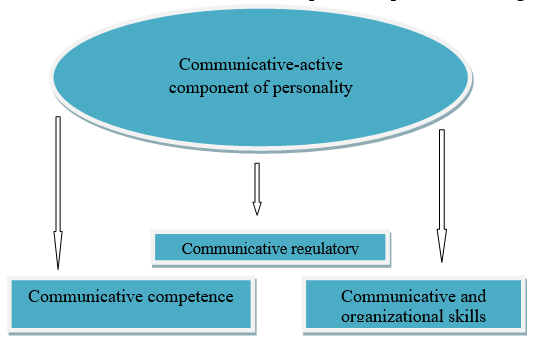
In the developed system and criteria for evaluating it, communicative competence is manifested in the ability of a teenager at risk to build their communication in accordance with the norms, values, traditions and customs of a public association, observing ethical standards of interaction.
Communicative and regulatory skills are manifested in the ability to make contact with team members, relatives, participants in the educational process, to give and receive compliments, respond to provocative and negative criticism, negative behavior of interlocutors, provide and accept sympathy and support from other people.
Communicative and organizational abilities are manifested in the ability to establish interpersonal relationships in a team, organize events of various kinds, rallying members of a public association. A necessary element of organizational skills is the ability to create and implement both individual and collective projects.
The unconditional acceptance of reality, the satisfaction of children’s parents, members of the team with the activities of a public association, is the main indicator of the formation of this communicative-activity component.
To assess the ethical standards of interaction, communicative competence and the main formed communicative skills of adolescents at risk, we adapted the methods of L. Michelson (Test of communicative skills translation and adaptation of Y.Z. Gilbukh), test “Communicative and organizational inclinations” (V.V. Sinyavsky, V.A. Fedoroshin), test for assessing communicative skills edited by A.A. Karelin.
The questions answered by adolescents at risk were divided into five types of communicative situations: 1) situations in which a positive reaction was expected to a partner’s saying; 2) situations with a negative reaction; 4) situations - requests; 3) conversation situations where reasoning was required; 3) situations of empathy, which helped to assess the understanding of the feelings and conditions of another person.
Based on the diagnostic results, mixed results of ethical standards and communicative competence of adolescents at risk were obtained. Look at the diagnostic data in Table
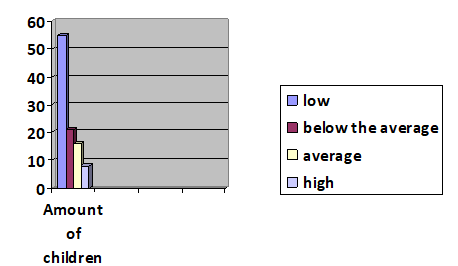
Diagnostic results showed that 55% of children are absolutely unable to give and accept compliments, respond to fair criticism, offend, provoke the behavior of team members, do not know how to ask their peers, do not know how to say no, don’t know how to give sympathy, support team members themselves accept the sympathy and support from friends, do not know how to make contact with a stranger.
The second block of questions was aimed at identifying communicative skills and organizational inclinations: a) attitude to public affairs and the ability to organize a team; b) the speed of orientation in complex problem situations and the ability to find a way out of the problems created; c) independence and initiative in decision making; d) perseverance and exactingness to team members; e) endurance and self-control.
Let us present the diagnostic results in Table
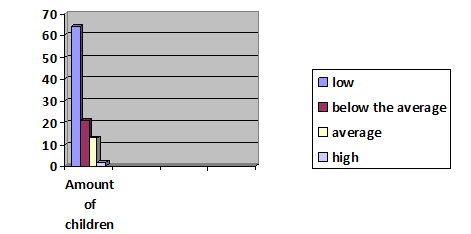
Analysis of the diagnostic results showed that 64% of adolescents at risk have the manifestations of organizational and communicative abilities at the low level. Children are indifferent to public affairs, do not know how to organize a team, do not navigate in difficult problem situations, are not able to find a way out of the problems created. This group of children lacks perseverance and exactingness towards team members, independence and initiative in decision-making. They are not patient and do not know how to regulate their emotional states.
2% of children are children with the high level of manifestation of organizational and communicative abilities of adolescents at risk. These are children who were instigators in scandal situations, their behavior was constantly monitored by the police and class teachers. This group of teenagers has not learned yet to respond inappropriately to the provocative behavior of the interlocutor, but at the same time they reacted positively to new acquaintances and the provision of assistance and support from others.
The analysis of the methodological problems of organizing the activities of public associations, practical experience and the results of the diagnosis of children and teachers allowed us to develop a system of pedagogical counseling for adolescents at risk in a public association. The system we developed was based on anthropological, personality-oriented, social-contextual approaches.
The subject of pedagogical counseling for the system we developed was the determination of ourselves and our place in the world, the construction of the route of personal development in accordance with the problems and life difficulties, the design and implementation of socially significant projects, and the implementation of our own life path. The components of the system of pedagogical counseling were interested observation, diagnosis, counseling, a systematic analysis of problem situations, programming and planning the activities of a public association, the creation and implementation of personal development routes, the formation of independence of a risk group teenager through freedom and activity in the implementation of socially significant ones.
The following areas of counseling were integrated in our model and tested system: psychological, social and medical areas.
At the first stage of counseling, a diagnostic function was implemented. Volunteers (psychologists and doctors) determined the psychophysiological characteristics of each personality. At the second stage, the designing function was implemented. Based on the results of the diagnosis of personality components, personality development routes were designed. Depending on the routes laid out, a role in the team was chosen for each child. Teenagers with a high level of communication and organizational skills were appointed as the leaders of the project teams. Further planning of the activities of the public association was built on free choice of an activity by the teenager at risk. Design and implementation of socially significant projects were an integral part of the program of activities of a public association. At the third stage, during the implementation of socially significant projects, an organizational function was implemented, where each child had the opportunity to feel themselves in the role of both the project manager and the executor. At the same time, the child mastered the ethics of interaction, communicative and regulatory skills.
In the implemented system the satisfaction was a significant indicator of relieving internal stress of adolescents at risk when communicating and interacting in a team, with parents and people around them. In the process of participation of children at risk in business, role-playing, organizational and activity games, during the brainstorming and other forms of social-contextual education, reflection took place. The child paid attention to their motives, interests, to themselves, to their activity, to the results of their own activity, their values. A prerequisite was the feedback between the teenager’s vision of the risk group of themselves, their results and the vision of the results by the head of the association, that is of great importance for the formation of the social and subjective position of each person.
“In the implementation of projects, freedom is the basis for creative power in the assimilation of values by each member of a public association” (Sukholentseva, 2019, p. 103).
Educational activities were based on free choice of each person. A prerequisite in the built-up system was classes in the club "Steps of Success", which were held in social context forms. In the course of business, organizational, role-playing games, discussions, disputes, socio-psychological trainings, brainstorming, etc., the basic components of the personality were corrected. Due to this interaction and analysis of historical, social experience and natural reality, social-subjective experience was acquired and a social-subjective position was formed.
In order to form a healthy lifestyle and improve the psychosomatic state of adolescents at risk, volunteers (doctors) conducted consultations and educational events. It was obligatory to carry out activities aimed at ensuring the safety of the child on the Internet, observing the rules of behavior in various life situations, etc. In carrying out activities, each child took responsibility both for their results and for the results of the whole team. With this approach, activities became a means of establishing the subjective experience of a teenager at risk.
“With this interaction, the subject was in the system of social and natural determination. The pedagogical system in this case was a deterministic system, the results of the action and the final state of which depended on the control actions of the head of the association, team and volunteers” (Sukholentseva, 2019, p. 103).
At the prognostic stage, a comparative description of the levels of development of the management system, personality, team, educational environment was carried out, the program of activities of the public association, the personal development route, and the life path of each teenager at risk were adjusted.
Based on the results of the conducted research, the second diagnostics was carried out according to the following indicators: 1) organization of the public association management system; 2) the personal development of adolescents at risk (developmental levels of cognitive, emotional-regulatory, communicative-active, motivational-personal components of each subject, levels of formation of subjective experience, levels of formation of socio-subjective position); 3) the satisfaction of children and parents with the results of the personal development route and the activities of the public association; 4) the levels of development of the public association and the educational environment.
We’ll present a comparative analysis of the results of the diagnosis of the communicative-activity component, which is the basis for ethical standards of interaction between team members at the ascertaining and controlling stage. Look at the data in Figure
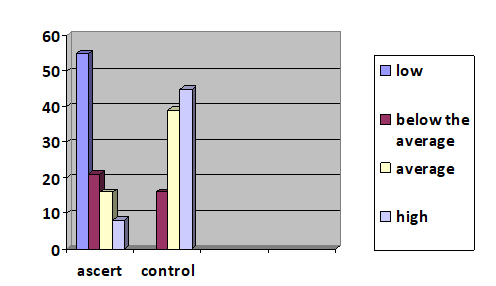
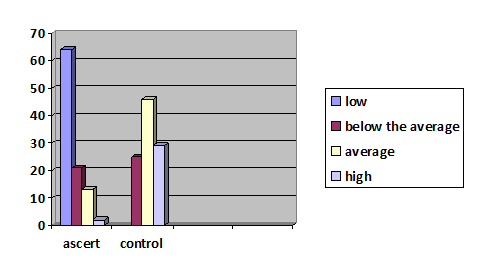
The results of the study showed a significant increase (from 30% to 40%) of each component from low to high, especially the levels of interaction ethics, communicative and regulatory skills and communicative competence of adolescents at risk, which indicates the effectiveness of the pedagogical system that we developed.
Adolescents at risk have mastered ethical standards of behavior: they learned to accept compliments, respond to fair criticism, learned to ask members of the team and strangers, learned to say no. In addition, they learned to give sympathy, support to members of the team, to accept sympathy and support from friends on their own, and learned to make contact with a stranger.
The analysis of the results of the controlling stage of the research allowed us to state that adolescents at risk have learned to navigate difficult situations quickly, find a way out of the problems, show independence and initiative, perseverance and exactingness to team members, mastered the ability to endurance and self-control.
The developed model was carried out by the authors in the process of organizing the activities of the Children's Public Organization of the Orel Region “Regional Pioneer Organization “Orlyata” (Regional), implementing the continuing education program for the methodologists of the Children's Creativity Houses, teachers-organizers, counselors of the Orel Region and Orel, at the courses held for counselors by Orel Institute for Teacher Improvement (2014-2016) and Institute for the Development of Education (2017-2020), at scientific and methodological seminars, conducted for deputy directors on educational work of Orel and the Orel region (2011-2020).
Conclusion
Thus, the system of pedagogical counseling is one of the types of patronage, a comprehensive system of assistance and support for the subject, a system for solving their problems. The process of interaction of subjects is built between the person who needs help and the people who provide it. The results of the study allowed us to note significant changes in the development components of each subject of a public association, the levels of formation of their subjective experience,levels of ethics of interaction and communication. In this regard, there is a need to create a system of pedagogical counseling in public associations.
The proposed system of pedagogical counseling for adolescents at risk in a public association will be useful: a) for the leaders of children's public associations to determine the methodology for organizing work with adolescents at risk, in particular, for the leaders of the Russian State School Students Movement; b) it can be used in the adjustment of curricula in the disciplines “Theories of training and education”, “Pedagogy”, “Theory of education”, “Organization of educational work in a public association”, the development of a module for the standard 3 ++: “Educational activity”, and disciplines such as “Organizational activity in children's associations, collectives, organizations, movements”, “Organization of volunteer activities”, “Support of the activities of informal associations”, etc.; preparing a new generation of textbooks, teaching aids on pedagogy, history of domestic upbringing, and education; c) in the system of professional development of educators (managers, teachers of additional education, organizing teachers, counselors, methodologists of institutions of additional education for children). We plan to introduce the developed system in the activities of public organizations in other regions.
References
- Alieva, L. V. (2017). Sotsial'no-pedagogicheskie tsennosti pionerskoj organizatsii – shkoly grazhdansko-patrioticheskogo vospitaniya detej i yunoshestva [Social and pedagogical values of the pioneer organization - the school of civil-patriotic education of children and youth], Vneshkolnik, 3(177), 22-26.
- Chadbourne, R. (2001). Middle schooling for the middle years: What might the jury be considering? Rhttp://www.aeufederal.org.au/Publications/Middleschooling.pdf
- Dunn, H. K., Pearlman, D. N., & Beatty, A. (2018). Psychosocial Determinants of Teens’ Online Engagement in Drug Prevention Social Media Campaigns: Implications for Public Health Organizations, 39(5), 469-481.
- Feldstein, D. I. (2011). Psihologo-pedagogicheskie problemy postroeniya novoj shkoly v usloviyah znachimyh izmenenij rebenka i situatsii ego razvitiya [Psychological and pedagogical problems of building a new school in the context of significant changes in the child and the situation of their development]. Innovative projects and programs in education, 3, 23-28.
- Frishman, I. I. (2018). Soderzhanie vospitatel'nogo protsessa vo vremennom detskom obyedinenii [The content of the educational process in a temporary children's association]. Models of creating an educational environment in educational organizations, organizations for children's recreation and their rehabilitation: science, technology, practice (pp. 44-49). Moscow State Pedagogical University, Federal Coordination Center for the training and support of counsellors.
- Gazman, O. S. (2002). Neklassicheskoe vospitanie: Ot avtoritarnoj pedagogiki k pedagogike svobody [Non-classical education: From authoritarian pedagogy to pedagogy of freedom]. MIROS.
- Lewis-Smith, R. I. (2018). Norman Erlend Mooney, Shackleton's “other” Boy Scout. Polar Record, 54(2), 152-157. https://doi.org/10.1017/S003224741800030X
- Litvak, R. A., Kninitsyna, E. V., Litvak, R. A., & Kninicyna, E. V. (2016). Sociocultural technologies in the process of socialization of adolescents in modern public associations, VESTNIK "ӨRLEU" – KST 14, 72-75.
- Ludicke, P., Muir, T., & Swabey, K. (2019). Identifying and supporting young adolescent academic underachievers in Year 7 and 8. Issues in Educational Research, 29(2), 458-484. http://www.iier.org.au/iier29/ludicke.pdf
- Mikhailova, N. N., & Yusfin, S. M. (2014). Svobodosposobnost' kak rezul'tat razvitiya subyektnosti rebenka v protsesse pedagogicheskoj podderzhki [Freedom as a result of the development of subjectivity of the child in the process of pedagogical counseling]. Bulletin of the Kostroma State University named after N.A. Nekrasov. Series Pedagogy. Psychology. Social work. Juvenology. Sociokinetics, 20(2), 143-147.
- Mudrik, A. V. (1996). Individual'naya pomoshch' v sotsial'nom vospitanii [Individual assistance in social education]. New values of education: care - support – counseling (pp.51-56), Moscow: Innovator.
- Orlova, L. N. (2018). Rol' orlovskoj oblastnoj pionerskoj organizatsii «Orlyata» kak subyekta sotsial'no-kul'turnogo prostranstva regiona v razvitii grazhdanskogo obshchestva [The role of the Orel regional pioneer organization "Orlyata" as a subject of the socio-cultural space of the region in the development of civil society], Socio-cultural potential of the region: uniqueness, priorities, innovations (pp. 43-46), Orel: Orel State Institute of Arts and Culture.
- Räty, L., Vehkakoski, T., & Pirttimaa, R. (2019). Documenting pedagogical support measures in Finnish IEPs for students with intellectual disability. European Journal of Special Needs Education, 34(1), 35-49. https://doi.org/10.1080/08856257.2018.1435011
- Růžičková, J., & Punová, M. (2018). Counselling in the difficult life situations of scout troop members. Socialni Prace, 18(2), 85-101.
- Sukholentseva, E. N. (2019). Svoboda v sisteme pedagogicheskogo soprovozhdeniya v obshchestvennom obyedinenii [Freedom in the system of pedagogical counseling in a public association]. Izvestia of the Voronezh State Pedagogical University, 4(285), 60-67.
- Sukholentseva, E., Gulakova, I., & Goltsova, T. (2019). To the problem of education of adolescents at risk in a public association in the process of pedagogical counseling. SHS Web of Conference 72, 030333 APPSCONF- 2019. https://doi.org/10.1051/shsconf /20197203032)
- Thomas, J. K. (2016). Re-engagement of students after an alternative education program. (Doctoral Dissertation). University of Tasmania. https://eprints.utas.edu.au/23489/
Copyright information

This work is licensed under a Creative Commons Attribution-NonCommercial-NoDerivatives 4.0 International License.
About this article
Publication Date
20 November 2020
Article Doi
eBook ISBN
978-1-80296-094-5
Publisher
European Publisher
Volume
95
Print ISBN (optional)
-
Edition Number
1st Edition
Pages
1-1241
Subjects
Sociolinguistics, discourse analysis, bilingualism, multilingualism
Cite this article as:
Sukholentseva, E. N., & Gulakova, I. I. (2020). Ethics Of Interaction Of Adolescents At Risk In The Pedagogical Counseling System. In Е. Tareva, & T. N. Bokova (Eds.), Dialogue of Cultures - Culture of Dialogue: from Conflicting to Understanding, vol 95. European Proceedings of Social and Behavioural Sciences (pp. 962-972). European Publisher. https://doi.org/10.15405/epsbs.2020.11.03.101

